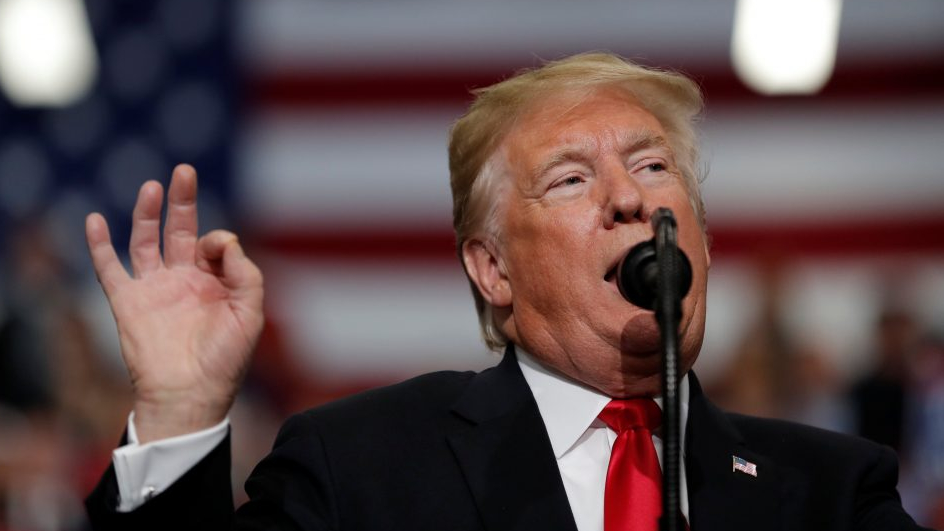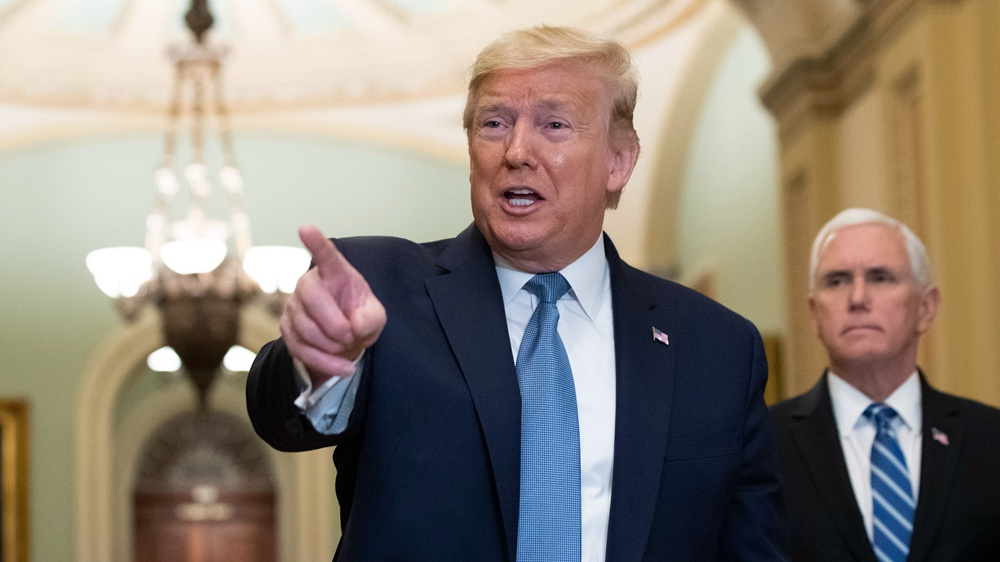
U.S. President Donald Trump has announced sweeping new travel restrictions on Europe in a bid to combat the spread of the coronavirus. /REUTERS
U.S. President Donald Trump has announced sweeping new travel restrictions on Europe in a bid to combat the spread of the coronavirus. /REUTERS
Editor's note: Mike Cormack is a writer, editor and reviewer mostly focusing on China, where he lived 2007-2014. He edited Agenda Beijing and is a regular book reviewer for South China Morning Post. The article reflects the author's opinions, and not necessarily the views of CGTN.
The inadequacy of the U.S. response to the coronavirus pandemic is becoming more apparent each day. In such a situation, there are three essential aspects to leadership: marshaling information, organizing people and goods, and communication - within the government, with other governments, and with the general public. On all three counts, the U.S. federal government has been embarrassingly, perhaps even fatally, negligent. China has significantly stepped up measures to cope with the outbreak since January, and this gave every nation on earth notice that a rapidly communicable virus was afoot and that action must be taken. It would be absurd folly to assume that in today's highly-integrated world any country could escape without infection.
And yet that seems to have been exactly what Trump did. His initial response, during January, was to stick his head in the sand and castigate others if they dared express concerns. He congratulated himself for a travel ban on people coming from China, bragged about the greatness of his administration's response, and dismissed all fears concerning the virus as politically-inspired attacks on him personally by the Democrats.
While the first U.S. patient had already been admitted to a hospital by January 19, Trump kept insisting that the number of those infected would be low and that the virus one day will disappear like a miracle. At no time did he convey any sense of knowledge of the facts, or the scale of the likely public crisis. It was like watching an errant schoolboy trying to deflect from the fact he hadn't done his homework by blaming the schoolteacher for having the temerity to ask him about it.
The depths of U.S. irresponsibility were made abundantly clear during several government events on Wednesday. Trump's speech from the Oval Office ought to have been an attempt to reassure the American citizens, financial markets, and the watching world. It achieved none of those goals, being extraordinarily unconvincing in both content and presentation.

U.S. President Donald Trump (L), accompanied by Vice President Mike Pence, speaks to reporters about the coronavirus outbreak on Capitol Hill in Washington, U.S., March 10, 2020. /AP
U.S. President Donald Trump (L), accompanied by Vice President Mike Pence, speaks to reporters about the coronavirus outbreak on Capitol Hill in Washington, U.S., March 10, 2020. /AP
Trump announced a plan to block visitors from 26 European countries from entering the United States but then he added that it would include goods and cargo. However, the White House later said the ban applies only to foreign nationals. But there is no evidence that travel bans help with pandemics, once they have entered a country.
For no clearly stated reason he excluded the UK and Ireland from the ban. Perhaps it is because he has hotels there. He then called for a three-month holiday on the payroll tax, at an estimated cost of 300 billion U.S. dollars, despite earlier saying that Democrat congressional calls for an 8.5-billion-U.S.-dollar program to tackle the virus was too high. In manner it was little better: Trump has always been better as an extempore speaker than delivering pre-written speeches, during which he often appears sullen or uninterested. With rasping throat, stolid body language and diffident articulation, he conveyed neither confidence nor strength.
Similarly, during a congressional hearing, American failings on organizing people and goods were made painfully clear. The House Oversight Committee questioned Dr. Anthony Fauci, the director of the National Institute of Allergy and Infectious Diseases, and Robert Redfield, the director of the Center for Disease Control and Prevention (CDC), among others, on efforts being made by the U.S. government against the outbreak.
According to Dr. Redfield, only 75,000 coronavirus testing kits have been made available. While on March 6, Vice President Mike Pence said that one million kits would be available "this week." This means that as of March 10 – more than two months from the initial announcement by China – the U.S. had only tested about 26 people per million, compared to 1,000 people per million in Italy and 4,000 people per million in South Korea. And under questioning from Rep. Harley Rouda, Dr. Redfield then admitted that without sufficient test kits, people who died of the coronavirus could have been misdiagnosed as having died of the flu – suggesting a possibly larger U.S. death toll than so far acknowledged.
The United States, of course, has a huge amount of resources and it spends more on healthcare than any other nation. In 2017, the U.S. spent about 3.5 trillion U.S. dollars on healthcare, or 18 percent of the GDP – more than twice the average among developed nations. But coordinating these resources into a strategic effort requires more than the private sector to sell customers goods for profit. It requires leadership. At some point the government must act to ensure rapid and equitable delivery. It must marshal, organize, manage, and communicate. The Trump administration has thus far shown little interest in any of these roles. Instead it is constantly verbally combative, venal, disorganized, and indifferent to facts. In this crisis, the U.S. desperately needs leadership. But it won't get it from Trump.
(If you want to contribute and have specific expertise, please contact us at opinions@cgtn.com.)